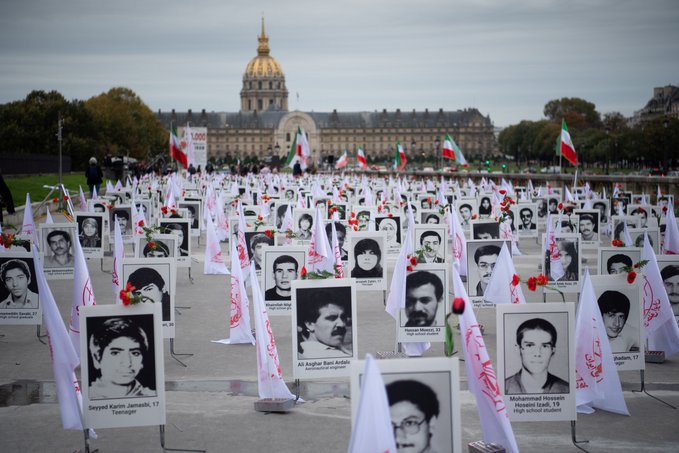Newsweek on 15 January 2021 published an op-ed by the JVMI calling on the UN High Commissioner for Human Rights to launch a Commission of Inquiry into the 1988 massacre of political prisoners in Iran.
The following is the full text of the article:
Source: https://www.newsweek.com/iran-massacre-1988-1561985

NEWSWEEK
It’s Not Too Late To Hold Iran’s Regime to Account for its Greatest Atrocity
HANIF JAZAYERI
ON 1/15/21 AT 4:45 PM EST
Some may argue that a 1988 massacre of thousands of political prisoners in Iran is too distant a memory to warrant attention today. Not so, when that massacre was so widespread and brutal that it constituted a crime against humanity, and certainly not so, when the perpetrators are currently running Iran’s Judiciary.
For comparison, imagine if Ratko Mladić, who massacred more than 8000 Muslim Bosniaks in Srebrenica was today appointed as Judiciary Chief of Bosnia. In Iran, Ebrahim Raisi who sat on the Death Commissions that carried out the 1988 massacre of more than 30,000 political prisoners is today the country’s Judiciary Chief.
The 1988 Death Commissions, whose members also include Iran’s current Minister of Justice, were established across the country following a fatwa by the Supreme Leader. Ayatollah Khomeini’s decree ordered the Death Commissions to immediately execute all supporters of the opposition group People’s Mojahedin Organization of Iran (PMOI or MEK) in Iranian prisons who remained loyal to the organization. Political prisoners affiliated to other groups were executed in a second wave, about a month later.
Since the massacre was ordered to be secret, none of the victims’ families were informed in advance, and none had the chance to say a final goodbye. Instead, prisoners were taken and hanged from cranes, usually six at a time. Their bodies were doused with disinfectant, and they were buried by night secretly in mass graves across the country.
On 3 September 2020, seven United Nations Special Rapporteurs sent a letter to the Iranian authorities reiterating that the 1988 massacre “could amount to crimes against humanity” which warrant an “international investigation”.
The UN experts made their letter public in December after the Iranian authorities failed to provide answers to the basic questions raised.
Justice for the Victims of the 1988 Massacre in Iran (JVMI), a London-based NGO representing the families of the victims, has interviewed dozens of survivors and received hundreds of written testimonies from the families demanding accountability and justice. JVMI has identified nearly 100 Death Commission members, including many who are currently in key posts in the Iranian government and Judiciary.
Though investigations have been carried by human rights groups such as JVMI and Amnesty International, the UN itself has never carried out an official inquiry to hold the perpetrators accountable.
The UN experts pointed out that the international community bore some responsibility for fueling impunity in Iran. International inaction over the 1988 massacre “emboldened” the Iranian authorities to “conceal the fate of the victims and to maintain a strategy of deflection and denial,” the UN experts said in their letter.
Such impunity was visible in December in the execution of Ruhollah Zam, a former resident of France, seen by observers as a political manoeuvre by the Iranian authorities. That act eventually prompted the French government and the European Union to cancel their appearances at the planned Iran-Europe Business Forum just days later. Without international attention, there is a real prospect of further extra-judicial and political executions being carried out in Iran.
While international attention had been missing for decades, the 1988 massacre has recently drawn attention in international circles.
On December 23, the United Kingdom’s Human Rights Minister Lord Ahmad of Wimbledon urged the authorities in Tehran to allow UN Special Rapporteur on Iran Javaid Rehman access to the country so that he could conduct research and investigations including into the 1988 massacre.
Meanwhile, in the United States, the State Department said it echoes the UN’s call for an independent investigation into the mass disappearances and summary executions in Iran in 1988, “though the alleged involvement of current senior officials makes it highly unlikely the regime will investigate itself.”
In Europe, Foreign Ministers of the European Union in December adopted a “global human rights sanctions regime” targeting those responsible for serious human rights violations worldwide, no matter where they occurred. On 17 December, the European Parliament voted in favour of a resolution calling on Iran to release those demanding truth and justice for the mass extrajudicial executions of the 1980s, while urging the EU to use its new “Magnitsky Act” to impose sanctions on Iranian officials perpetrating human rights abuses.
With momentum finally starting to build, it is way past time for UN High Commissioner for Human Rights Michelle Bachelet to formally establish a Commission of Inquiry to investigate the crimes against humanity perpetrated in Iran in 1988.As EU Foreign Ministers are set to meet once again in Brussels on 25 January, the families of the victims expect them to target the perpetrators of the 1988 massacre through their new human rights sanctions regime and to support the establishment of an independent Commission of Inquiry into Iran’s greatest atrocity.
Hanif Jazayeri is Secretary of London-based NGO Justice for the Victims of the 1988 Massacre in Iran (JVMI) and a news editor. His Twitter handle is @HanifJazayeri.

